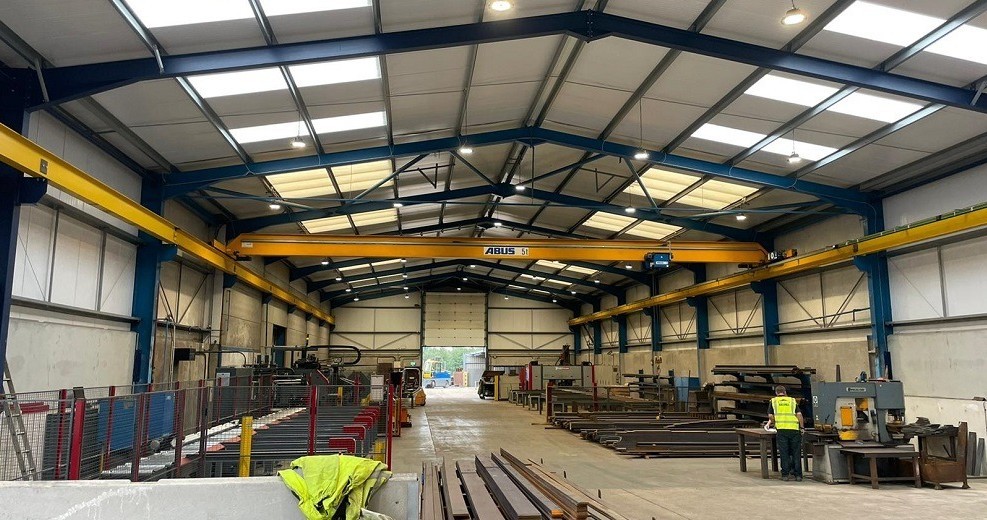
A £20,000-a-year savings is one of the major benefits of Wareing Buildings’ energy audit with MaCaW; a University of Central Lancashire (UCLan) project funded by the ERDF and UCLan, and supported by Boost, Lancashire’s business growth hub. But finding the source of unexplained energy consumption at night could be just as big a bonus. Wareing Buildings of Wrea Green has been supplying agricultural and industrial buildings since 1909. Today, its steel framed structures are used as livestock sheds, recycling depots, stables, retail units and much more (including mosques, boatyards, football stands and even the giraffe house at nearby Blackpool Zoo). Matthew Hastwell is Wareing Buildings’ steel detailer, and the third generation of his family to work for the business. No stranger to carbon reduction initiatives (the company already has a ground-based solar array in place), Matthew was eager to reduce the business’ carbon footprint further and futureproof it from rising energy costs.
“We've been actively looking to become more energy efficient,” says Matthew. “It’s the way our industry’s heading because we all want to save money on energy bills. It’s also more attractive to potential customers who want to work with partners who are energy conscious. “And obviously, if we can cut our energy costs we can pass those on to our customers.”
Matthew had already started investigating how to reduce Wareing Buildings’ carbon footprint. He happened to mention it to a friend who had just had a carbon audit completed by MaCaW. “We wanted to understand the effect of the work we’d done so far (in terms of carbon and money) and understand what more we could do. We knew we needed to speak to experts with real understanding of this who could offer us a fresh perspective. Finding out about MaCaW at that point was perfect timing.” The audit was completed in January 2022 and the carbon footprint assessed using billing data for resources including:
A number of improvement recommendations were made, including an additional solar array, minimising compressed air leaks and switching to electric vehicles. One of the key recommendations was the completion of the switch to LED lights, for which J Wareing & Sons was able to apply for (and receive) £15,000 of matched funding. “We had already changed the office lights to LED,” Matthew explains, “but the MaCaW audit found that switching the entire site to LED would save us about £20,000 a year. And we got a grant.” Additionally, MaCaW estimated the switch to LED alone would save 45.79 tCO2e/annum, a 7.8% reduction in Wareing Buildings’ annual carbon footprint. Cost savings were based on Wareing Buildings’ existing (and extremely competitive) energy deal. If the audit was carried out today, those savings would have been significantly higher.
A major surprise was the energy consumption revealed by the audit report. “We seem to be using a lot of electricity at night,” says Matthew. “That’s strange, because there’s really nothing that should be that power hungry at that time of day. We're currently investigating it with our supplier and they’re installing a special meter that will give us an hour-by-hour readout of what we’re using so we can solve the problem. Without the audit, we’d never have known about it.”
Next on the improvement list, and as recommended by the audit, is the installation of infrared heating in the workshop where Wareing Buildings’ services and maintain its plant and vehicles. “We were a bit naive when we built the warehouse,” admits Mathew. “We installed a wet heating system like the one you’d have in your house, but with the huge roller doors opening and closing all day as vehicles come in and out, all the warm air disappears instantly. The heating’s always on. Infrared heating will heat the people rather than the air so it won't matter about doors being open. “With greater solar generation capacity on site, we’ll be able to produce our own energy to power the heating for much of the year.”
As MaCaW was recommended to Matthew, he’s happy to pay that recommendation forward. “It’s a no brainer for any business,” he says, enthusiastically. “We’ve seen the value of their work. They’re easy to work with and very friendly. The only drawback is that everybody’s trying to get hold of them!” To explore how MaCaW could help make your business more efficient while supporting your carbon reduction activities, contact us. MaCaW is a UCLan project, an industry and academic collaboration funded by the ERDF alongside UCLan, and supported by Boost, Lancashire’s business growth hub.



The website uses cookies.
Some are used for statistical purposes and others are set up by third party services. By clicking 'Accept all & close', you accept the use of cookies. For more information on how we use and manage cookies, please read our Cookie Policy.